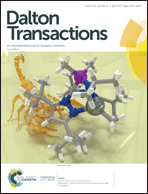Transformation of molecular compounds with Ba(Sr)/Al/Si and Ca(Sr, Ba)/Ti(Zr, Hf)/Si heteroelements as new efficient route to metal silicate materials†
Abstract
Silicon-based moieties were anchored in heterometallic alkoxide platforms to obtain molecular clusters based on the M–O–M′–O–Si motif for the generation of mixed-metal silicate materials. Single-source molecular precursors with structures [M{(μ-ddbfo)2Al(OSiPh3)2}2], where dbbfoH = 2,3-dihydro-2,2-dimethylbenzofuran-7-ol and M = Ba (1), Sr (2), [Sr4Ti2(μ6-O)(μ3,η2-OCH2CH2OMe)8(η-OCH2CH2OMe)2(OSiPh3)4] (3), [Sr4M′2(μ4-OH)(μ3,η2-OCH2CH2OMe)4(μ,η2-OCH2CH2OMe)6(μ-X)(OSiPh3)4] (4, with M′ = Zr and X = Cl; 5 with M′ = Hf and X = OH), [Sr3Hf2(μ5-O)(μ3,η2-OCH2CH2OMe)4(OCH2CH2OMe)4(OSiPh3)4] (6), and [Ca2M′2(μ3-OH)2(μ,η2-OCH2CH2OMe)4(η2-HOCH2CH2OMe)2(η-OCH2CH2OMe)2(OSiPh3)4] for M′ = Zr (7), Hf (8), were prepared by substitution of methyl groups, using Ph3SiOH or chloride atoms with KOSiPh3, in [M{(μ-ddbfo)2AlMe2}2] (M = Sr, Ba) or [M4M′2(μ6-O)(μ3,η2-OCH2CH2OMe)8(OCH2CH2OMe)2(HOCH2CH2OMe)xCl4] (M = Ca, Sr, Ba, M′ = Ti, Zr, Hf and x = 0, 4). The precursors were characterized by elemental analysis, NMR spectroscopy, and single-crystal X-ray structural analysis. Thermal decomposition of compounds 1–8 at 1000 °C led to formation of ceramic materials that consisted of mixed-metal oxide nanocrystallites embedded in an amorphous SiO2 matrix. Compounds 1 and 2 decomposed to BaAl2Si2O8 and SrAl2Si2O8 aluminosilicates, 4 gave a mixture of SrSiO3, ZrO2, SrZrO3 and Sr7ZrSi6O21, 5 and 6 gave mixtures of various compounds, including SrHfO3, Hf0.96Si0.04O2, and SiO2, 7 lead to CaZrO3, ZrO2 and Ca3ZrSi2O9 and 8 gave a HfO2, Ca2HfSi4O12 and SiO2 phase. The thermolysis of compound 3 gave SiO2 particles of average size 40–90 nm, which contained spherical SrTiO3, SrSiO3 and Sr2TiSi2O8 nanocrystallites of diameter 5–16 nm.



 Please wait while we load your content...
Please wait while we load your content...